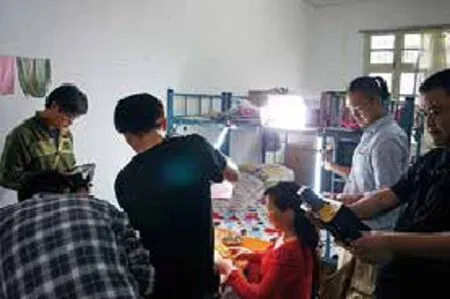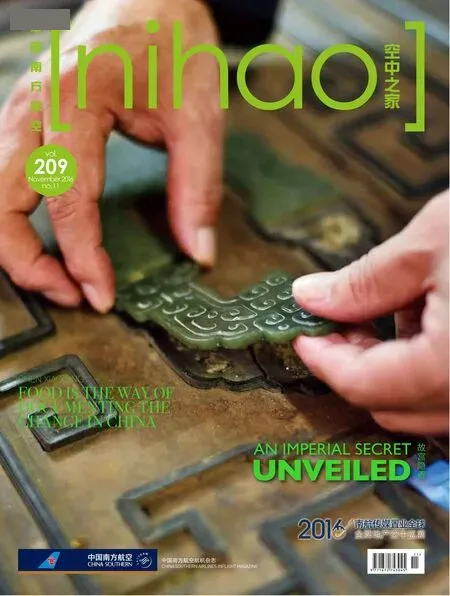陈晓卿:他用美食记录中国
2016-06-05TextbyLanXiaojiangTranslationbyBianJiajingPhotosbyLiuJunYangMingCFP图片由受访者提供
Text by Lan Xiaojiang Translation by Bian Jiajing Photos by Liu Jun & Yang Ming & CFP (图片由受访者提供)
陈晓卿:他用美食记录中国
Text by Lan Xiaojiang Translation by Bian Jiajing Photos by Liu Jun & Yang Ming & CFP (图片由受访者提供)
CHEN XIAOQING FOOD IS THE WAY OF DOCUMENTING THE CHANGE IN CHINA
Every friend of mine got excited when he or she heardNihaowas going to interview Chen Xiaoqing, the general director of the series documentariesA Bite of China, and then swallowed. Finally, he or she would say: Thank Chen and his documentaries for showing the whole world the profoundness and broadness of Chinese dietary culture. But gentle Chen for the first time, refuted this as he heard my report: we are not to expand or to enrich what, just documenting the ordinary daily life. To tell stories with open mind is the real confidence in our own culture.
1
It's necessary to introduce the phenomenal documentaryA Bite of Chinaat first.
In 2012, a documentary about foods all over ChinaA Bite of Chinabecame a national hit suddenly and especially popular among young people, although its original intention was just a normal documenting and discovery on foods made by CCTV9. It's reported that it has been played on all kinds of video platforms for over 800 million times, and its overseas sales have added up to 350 thousand dollars each episode. The audience of A Bite of China 2 surpasses some hot TV shows and series, which makes it most-watched documentary in China by now. Thousands of people are talking over this documentary online, and some self-created works such A Bite of Anhui and A Bite of Hubei appear online. Even some foreign fans made similar works A Bite of Germany and A Bite of France. This documentary becomes an entrance for foreigners to know about China and to communicate more with this country……The generation after 80s and 90s have never been so enthusiastic about their own hometowns and the foods from their hometowns. Many of them begin to call themselves“ foodies”and regard A Bite of China as Bible of searching for traditional foods all over the country. The foods documented into A Bite of China are all labelled as top classics and sold out very soon.
For outsiders, it is the general director Chen Xiaoqing and his team that made A Bite of China so hot. However, Chen doesn't like this saying.“As a documentary maker, I don't like to raise anything or push my audience into anything. The audience are mature, and you must make what they really want to see. When you reveal something touching and sensitive in the upmost superficial layer, they feel the attraction of documentary. This maybe the reason why people likeA Bite of Chinaso much.”
Down to earth, honest, unassuming— that's people's impression of Chen and this also helps build a mass base for his work. After the success ofA Bite of China, there are still many people coming across him while queuing up for snacks. He said his attitude and style of eating had never changed. He loved checking out some locally popular restaurants.“Only when I am sitting among the people speaking Sichuan dialect, I feel that the taste of hotpot is just right,” he explained with his honest smile.“Maybe there is a small change. In the past, when I came to a new place, I would normally ask native people on Weibo or directly ask taxi drivers. Now, there are usually acquaintances showing me around. For example, I just came back from Wuhan. A traffic police found some delicious hot noodles with sesame paste and fried tofu skin with three delicacies for me.” He then paused and said,“After all, many taxi drivers are not native. Like when I was in Qingyuan, Guangdong, the driver was from Pinggu, He Bei.”

During the 19th Shanghai TV Festival, Jury for Documentaries Chen Xiaoqing was discussing the appraisal with the Committee Chairman Yves Jeanneau.上海第19届上海电视节,作为纪录片评委的陈晓卿与评委会主席伊夫·让诺商议评审。
2
Shihang, a famous scriptwriter, who started to know Chen more than decades ago in the famous online community “Xici Hutong”, said, Chen was very shy and clever. For this comment, Chen smiled bashfully as usual. “ People who are clever, just like my friend Zhang Lixian (a famous publisher) said, need to do your work awkwardly.”
During the shooting of Bite 2, Chen and his team spent 500 days in more than 150 places. “We are using western methods of shooting, and the most stressful part is field study. We record one or more inspectors in one place, and every episode is 50 minutes, so the study costed more than 100 days in average.” One of the stories was 6 minutes' shot film and about bee keeper. They shot twice, did the field study three times, passed through places for over 2000 km.
After the success of Bite Series, he did more awkward work. “During the process of Bite2, we touched something about the society, such as leftover children. Because while we were shooting the foods, all the rural foods were presented by old people. The young move to the city and work, and children are left to the old. As a documentary maker, you can't help recording this.”
Yet the in process A Bite if China 3 once again focuses on Chinese food in a worldwide sense. From Chen's opinion, as a documentary maker, this is still the contemporary age that cannot be neglected. “Chinese economy has developed, Chinese get richer, and Chinese foods will be newly recognized by the world. And this is just the developing rule. Chinese food has a 3000-year history, but it doesn't mean it's superior to other culture, for culture has no hierarchy. I hope we can stay confident of our culture,” said Chen. “I also hope our young people can see delicacies, and know more about China through knowing about Chinese food. Keep the ability to think independently and not be deluded.”

After being documented, steamed pork in Jun'an is soon renowned all over China.均安蒸猪被报道后,立刻扬名全国。

Behind the scenes of A Bite of China .《舌尖上的中国》拍摄幕后。
身边每个人听说《NIHAO》要采访《舌尖上的中国》总导演陈晓卿,都是同样的反应:先是兴奋惊呼,然后猛吞口水,最后,充满钦佩地说:他和《舌尖》向全世界弘扬了中国美食文化的博大精深。
然而,一直温和的陈晓卿却在听到这句表扬时,变得有点严肃。他说:“我们不是在弘扬什么,只是记录寻常智慧。以一个开放的心态去讲故事,才是真正的文化自信,才是正确的三观。”
1
有必要先介绍一下《舌尖》现象。
2012年,一部讲述中华各地美食的纪录片《舌尖上的中国》,突然在全国尤其是年轻人群中引爆了,虽然,它的初衷只是央视纪录片频道的一次常规探索。
据说,它在视频平台播放次数超过8亿次,海外单片销售额高达35万美元。在很多国家,它甚至被当成了解中国的窗口。网上迅速出现了“舌尖上的安徽”“舌尖上的湖北”等网友自创作品,甚至有外国朋友做了“舌尖上的德国”“舌尖上的法国”。80后、90后们对自己家乡和家乡的传统美食从未有过的热情高涨起来,越来越多的人开始自称为“吃货”,《舌尖上的中国1、2》也被当成了搜索中国各地美食传统的“宝典”。而被“舌尖”拍摄过的美食立刻成为 “名品”,迅速被市场抢购一空。
在外界看来,掀起这一传奇的就是《舌尖上的中国》总导演陈晓卿和他的团队。不过,他本人并不喜欢这个观点。“我是做纪录片的人,我特别不喜欢去掀起什么,去让观众看什么。观众都是成熟的,你得拍他想看的。而流露到最浅表层面的动人之处,就是纪录片最有魅力的。这可能也是《舌尖上的中国》吸引到大家的地方。”
接地气,实诚,不摆架子,是很多民众对陈晓卿的印象。《舌尖》成功后,依旧有很多观众在排队买小吃时意外碰到他。他说自己吃美食的习惯从来没变,最喜欢到当地找当地人最喜欢去的小馆子。“只有坐在周围都是说四川话的人堆里,我才觉得吃下去的那口火锅,味道是对的。”他憨憨地笑着说,“不过,以前我去一个新的地方,会提前发一个微博询问网友,或者问出租车司机。现在,一般都有熟识的当地朋友带着我了。比如我刚去武汉,就是一个交警带我找到了特别好吃的热干面和三鲜豆皮。而且,现在出租车司机也很多不是当地人了。我之前去广东清远,开车的出租车司机是河北平谷的。这大概就是城市的变化。”
2
十几年前,就与陈晓卿在网络社区“西祠胡同”相识的名编剧史航说:“陈晓卿,是一个羞涩的人,一个聪明的人”。他的记忆力极好,在什么地方吃过什么样的食物,见过什么人,说过什么话,常常张口就能说出来。肚子里不知道有多少关于美食的故事和往事。
不过,听到“聪明人”这个评价,陈晓卿还是露出招牌的羞涩。“聪明人——就像我的朋友老六(《读库》主编 张立宪)说的,是要下点笨功夫的。”他说。
《舌尖2》的拍摄也是用的笨功夫。整个过程中,他和他的团队用了500天,辗转了150个拍摄地点。“我们用的是西方的拍摄方式,最辛苦是做田野调研。一个地方派一个到多个调查员,如果每一集播出50分钟,那么平均的调研时间是100多天。”据说,其中有一个关于养蜂人的6分钟短故事,团队去现场拍摄两次,调研了3次,辗转2000公里。
《舌尖》系列成功后,他下的笨功夫更多。有的是在表达方式上,更多的,我觉得是在对表达方向的思考上。“《舌尖2》,我们触碰到一些社会层面的内容比如留守儿童,那是因为我们发现凡是农村的食物,它的主人公都是老人,年轻人都进城务工了,孩子都由老人带着。作为一个纪录片人,看到这些你无法不把它记录下来。”
而即将拍摄的《舌尖3》又将把目光放在世界框架下的中国美食,这大概依然是他觉得不可忽视的当下。“中国的经济发展了,中国美食当然也在世界范围内会被一步步重新认知——这是符合发展规律的。中国美食有3000年的文化,但这不代表高于别的文化的,文化没有高低之分。我希望,我们能保持这个文化自信。我更希望我们的年轻人看到美好的食物,通过食物了解当下的中国,但能始终保持独立思考的能力。”

